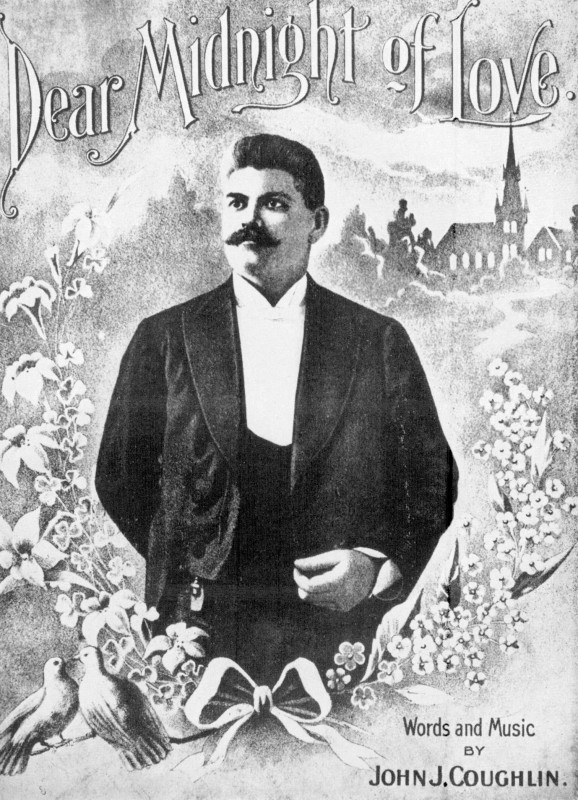Beneath the corrupt exterior of alderman “Bathhouse John” Coughlin beat the heart of a poet. On October 8, 1900, his sentimental ballad Dear Midnight of Love debuted at the Chicago Opera House, sung by thirteen-year-old May “The Silver-Tongued Nightingale” de Sousa and a fifty-voiced chorus.
Coughlin earned his nickname by giving massages to men in a bathhouse at 205 Clark Street in his native First Ward in the near South Side. He moved to the bathhouse in the Palmer House Hotel where he rubbed up against politicians and bigwigs. In 1882, he opened his own and soon owned a series of them. His ambition led him to pursue the office of alderman. He filled the First Ward’s position in 1892.
He partnered up with saloon owner and First Ward co-alderman Michael “Hinky Dink” Kenna. The two became known as the Lords of the Levee, the notorious Chicago vice district of gambling palaces and whorehouses. They ran an insurance company that provided protection (i.e. extortion) for the dens of vice, traded Chicago politics for kickbacks and bribes (known as “boodling”) and hosted the annual First Ward Ball, a notorious political fundraiser that featured a parade of prostitutes and often ended in a near-riot. Coughlin served as an alderman for 46 years.
The flashy Bathhouse John revealed his tender side in 1900 when he set his poem Dear Midnight of Love to music. Although the sheet music lists words and music by John J. Coughlin, arranger Max Hoffman provided the tune. Levee cop John de Sousa touted his daughter May’s singing, so Couglin dropped by her school, auditioned her on the spot and approved her as the voice for his words.
On October 8, the Chicago Opera House overflowed with spectators. The evening was presented as a variety show with dancers and comic acts. May de Sousa started the final set with a piece from Victor Herbert’s The Fortune Teller. Then, for Dear Midnight of Love, the fifty men and women in the Cook County Democratic Marching Club backed her. There were multiple encores, and Bathhouse John came onstage to lend his voice.
[youtube https://www.youtube.com/watch?v=wi-N0Td4rL0]
Soon, the sheet music could be found on the pianos of the Levee, notably in the legendary bordello the Everleigh Club. That was just the beginning of the Coughlin the Poet. The Chicago Tribune often published his works, although the poems often appeared in whichever paper employed a writer named John Kelly at the time. Titles included “Ode to a Bathtub,” “Oh! For the Life of an Alderman,” “An Ode to a Bowl of Soup,” “She Sleeps at the Side of the Drainage Canal” and “They’re Tearing Up Clark Street Again.” In 1932, Kelly admitted to writing Bathhouse John’s poems, including the lyrics to Dear Midnight of Love. Even Coughlin’s poetry was corrupt.
For the story of the larger-than-life Bathhouse John and the taciturn Hinky Dink, read Lords of the Levee by Lloyd Wendt and Herman Kogan from Northwestern University Press.


There are no voices yet... Post-script us a message below, won't you?